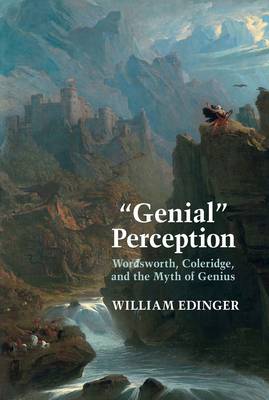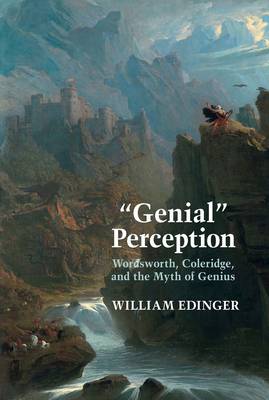
- Retrait gratuit dans votre magasin Club
- 7.000.000 titres dans notre catalogue
- Payer en toute sécurité
- Toujours un magasin près de chez vous
- Retrait gratuit dans votre magasin Club
- 7.000.0000 titres dans notre catalogue
- Payer en toute sécurité
- Toujours un magasin près de chez vous
Genial Perception
Wordsworth, Coleridge and the Myth of Genius in the Long Eighteenth Century
William C Edinger
271,45 €
+ 542 points
Description
Genial Perception offers a critical examination of Wordsworth's and Coleridge's naturalist construction of creative and critical perception, and a historical study of the perceptual dimension of poetic taste. "Genial" is the adjectival form of "genius," and eighteenth-century critical naturalism understands "genial" perception as a gift of nature, as an inborn power operating autonomously through the senses and imagination and thus independently of cultural influence.
By exploring the philology of keywords and binaries inherited by the two poet-critics and used to describe and interpret their perceptual experience, both creative (imaginative) and critical, Genial Perception traces how that experience reveals an unacknowledged indebtedness to discourse and language, having been silently and perhaps unconsciously shaped by patterns and trends in the literary culture in which Wordsworth and Coleridge came of age. This study shows that critical perception, often thought to be too elusive and subjective to make a proper subject for historical investigation, can be approached through study of the terms--the language--of the practical criticism that attempts to communicate it; that both critical and creative perception are far more dependent on language than is commonly recognized; and that philology, by recovering the original usage, functions, and contexts of critical keywords, provides for an accurate historical understanding of the claims made by critics in the long eighteenth century for "genial" perception, and can illuminate the dynamics of "genial" perception itself.Spécifications
Parties prenantes
- Auteur(s) :
- Editeur:
Contenu
- Nombre de pages :
- 304
- Langue:
- Anglais
- Collection :
Caractéristiques
- EAN:
- 9781638040224
- Date de parution :
- 01-06-22
- Format:
- Livre relié
- Format numérique:
- Genaaid
- Dimensions :
- 152 mm x 229 mm
- Poids :
- 616 g

Les avis
Nous publions uniquement les avis qui respectent les conditions requises. Consultez nos conditions pour les avis.






